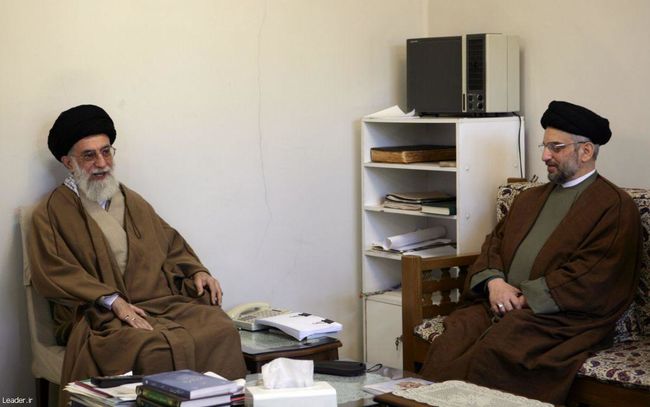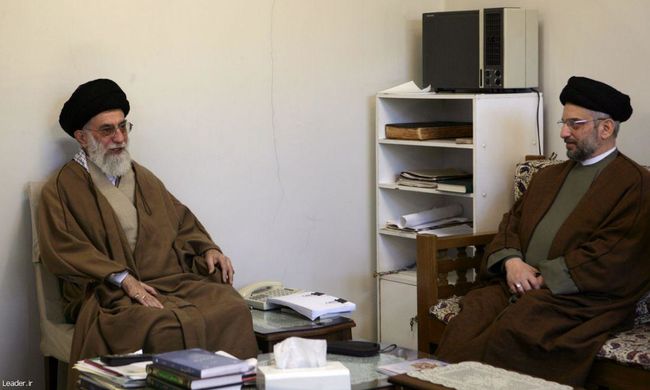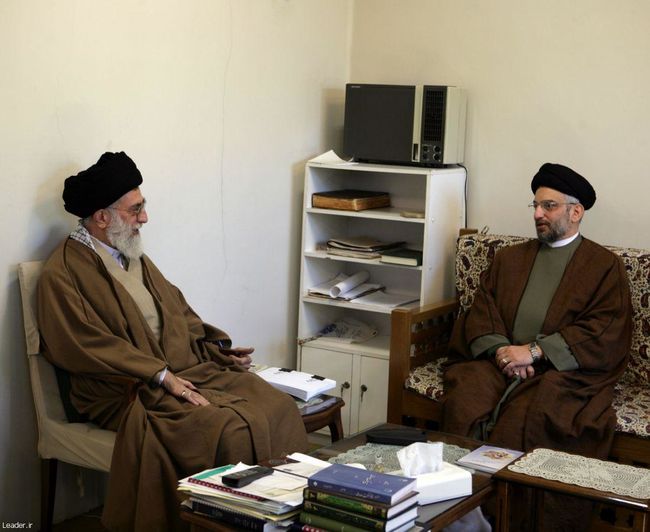Islamic Revolution Leader Ayatollah Sayed Ali Khamenei received Sayed Abd al-Aziz Hakim, head of the Supreme Council for the Islamic Revolution in Iraq, Monday and described Iran-Iraq relations as very consolidated.
"These relations are backed by an age-old background of religious, cultural and historical ties between the two nations along their long common borders," Ayatollah Khamenei said, adding that the Islamic Republic of Iran has always promoted the territorial integrity, security, progress, and development of Iraq.
Ayatollah Khamenei pointed to America's efforts to strain the rooted relations and said that the Islamic Republic of Iran follows the policy of supporting the Iraqi government.
"The Iraqi people, Shiites, Sunnis, Kurds, Turkmens, or Arabs must keep their vigilance, unity, integrity and solidarity," the IR Leader urged.
"If the Iraqi people and government enhance their solidarity and internal relations, the Occupiers will no longer find an excuse to remain in Iraq and they'll have to exit the country," Ayatollah Khamenei said.
Ayatollah Khamenei regretted the killings of innocent Iraqi people, Shiite or Sunni, and underlined the necessity for all Iraqi groups and parties to support the Iraqi Premier Nouri al-Maliki's administration as a telling measure to counter insecurity.
"The presence of the occupiers constitutes a key factor behind insecurity in the country," the IR Leader said.
Ayatollah Khamenei praised the role of Marjayia (religious authority) in Iraq.
The IR Leader then recalled the February 2006 tragedy of Samarra Shrine bombing in which the mausoleum of two Shiite Imams was desecrated. Ayatollah Khamenei warned about forgetting the bitter event, adding, "The key perpetrator in the event was America, because terrorists committed the sacrilege before the eyes of the American military forces."
Abd al-Aziz Hakim for his part briefed the IR Leader on the latest developments in Iraq. He praised IR. of Iran for its constructive role in Iraq and thanked the country's assistance to the Iraqi government and people.
Hakim highlighted the presence and vigilance of the Iraqi people marked by their massive, enthusiastic participation in the mourning ceremonies in Muharram and described the presence as a favorable bulwark for the Iraqi government.
Hakim then briefed on the measures adopted by Maliki government to stifle insecurities and said that the Iraqi government had drawn up an initiative by which to hold security in its hands, restore stability and render different services and facilities to the Iraqi people to lift them from life problems.
"These relations are backed by an age-old background of religious, cultural and historical ties between the two nations along their long common borders," Ayatollah Khamenei said, adding that the Islamic Republic of Iran has always promoted the territorial integrity, security, progress, and development of Iraq.
Ayatollah Khamenei pointed to America's efforts to strain the rooted relations and said that the Islamic Republic of Iran follows the policy of supporting the Iraqi government.
"The Iraqi people, Shiites, Sunnis, Kurds, Turkmens, or Arabs must keep their vigilance, unity, integrity and solidarity," the IR Leader urged.
"If the Iraqi people and government enhance their solidarity and internal relations, the Occupiers will no longer find an excuse to remain in Iraq and they'll have to exit the country," Ayatollah Khamenei said.
Ayatollah Khamenei regretted the killings of innocent Iraqi people, Shiite or Sunni, and underlined the necessity for all Iraqi groups and parties to support the Iraqi Premier Nouri al-Maliki's administration as a telling measure to counter insecurity.
"The presence of the occupiers constitutes a key factor behind insecurity in the country," the IR Leader said.
Ayatollah Khamenei praised the role of Marjayia (religious authority) in Iraq.
The IR Leader then recalled the February 2006 tragedy of Samarra Shrine bombing in which the mausoleum of two Shiite Imams was desecrated. Ayatollah Khamenei warned about forgetting the bitter event, adding, "The key perpetrator in the event was America, because terrorists committed the sacrilege before the eyes of the American military forces."
Abd al-Aziz Hakim for his part briefed the IR Leader on the latest developments in Iraq. He praised IR. of Iran for its constructive role in Iraq and thanked the country's assistance to the Iraqi government and people.
Hakim highlighted the presence and vigilance of the Iraqi people marked by their massive, enthusiastic participation in the mourning ceremonies in Muharram and described the presence as a favorable bulwark for the Iraqi government.
Hakim then briefed on the measures adopted by Maliki government to stifle insecurities and said that the Iraqi government had drawn up an initiative by which to hold security in its hands, restore stability and render different services and facilities to the Iraqi people to lift them from life problems.



